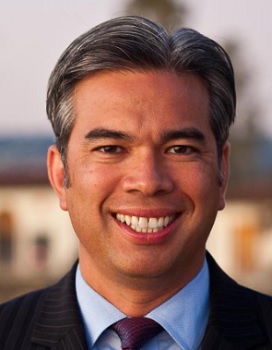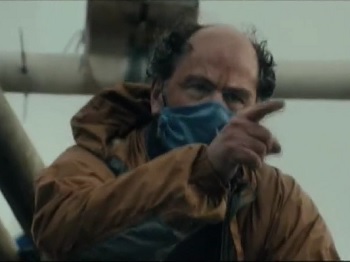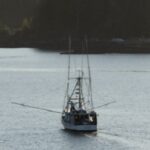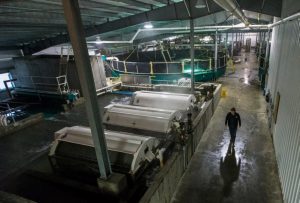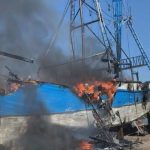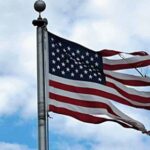Category Archives: Pacific
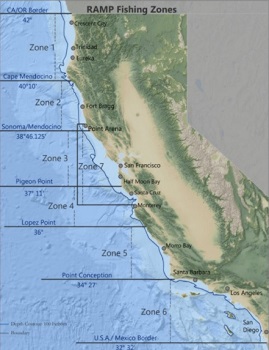
California Commercial Dungeness Crab Update
The California Department of Fish and Wildlife (CDFW) just completed the most recent marine life entanglement risk assessment under the Risk Assessment Mitigation Program (RAMP). Recent survey data indicate most Humpback and Blue whales remain outside of the California fishing grounds, however a few Humpback whales have begun to return to Monterey Bay and the Gulf of the Farallones. As a result, the Director of CDFW has issued a statewide Fleet Advisory for the commercial Dungeness crab fishery for all Fishing Zones (Oregon state line to Mexico). >click to read< 08:22
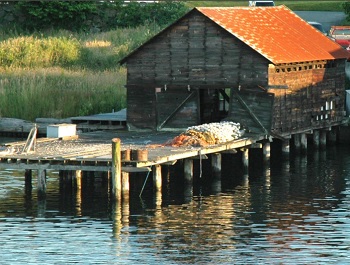
Historic Ancich netshed nearly ready for commercial fishboat use
The City of Gig Harbor is within weeks of making the historic Ancich net shed and pier available for use by commercial fishermen,,, Fisherman Peter Ancich built the net shed in the 1920s. It was acquired by the city as part of Ancich Park in 2012. It is one of only 17 netsheds remaining in Gig Harbor, most of them in private hands. Seven remain working net sheds. Fishing vessel owners, especially those with smaller boats without home sheds, have been lobbying the city for several years to reopen the Ancich pier and shed for shared used among commercial boats. >click to read< 16:41
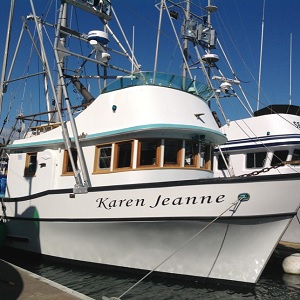
California salmon season delayed and shortened, angering North Bay fishermen. Closest start may be May 1
Expected to be decided within the next few weeks, there are three proposals on the table, all shorten the season considerably. The closest start may be May 1, instead of April. Association President John McManus predicted a 40% loss in the season for sports fishermen, while Crescent City commercial fisherman George Bradshaw predicted the industry’s take would be down by two thirds. The bad news for a delayed and restricted salmon fishing season comes on the heels of a slow, sputtering start for crab fishing fleets, which were stalled while fishery officials waited for migrating whales to leave the coastal region. >click to read< 08:05
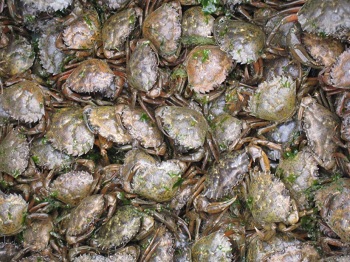
Lessons From a Failed Experiment – When ‘Eradicated’ Species Bounce Back With a Vengeance
The study, published today in the journal PNAS, chronicles the effort and failure to eradicate invasive European green crabs from a California estuary. The crabs increased 30-fold after about 90 percent had been removed. The study is the first experimental demonstration in a coastal ecosystem of a dramatic population increase in response to full eradication. The crab is considered among the world’s top 100 invasive species, costing the U.S. commercial shellfish industry about $20 million in annual losses. >click to read< 08:09
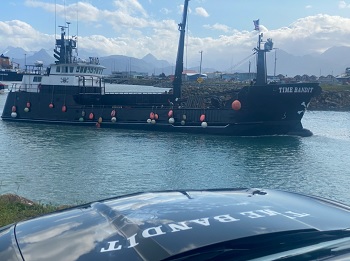
Deadliest Catch: Hillstrand coming out of retirement. Sig says, “what we need are legends” for the industry to survive
Season 17 – We know that the pandemic has taken a major hit on the fishing industry. But the virus hasn’t been the only factor that destroyed crab fishing quotas, the crew also struggles with illegal fishing from the Russians. Johnathan Hillstrand not only knows how to retain fishing quotas but can keep the crab population sustainable, something that illegal fishermen don’t prioritize. As far as the pandemic is concerned, Northwestern Captain Sig Hansen knows that he needs the best in order to save the crab fishing industry. This is where Johnathan Hillstrand comes in. Sig says, “what we need are legends” in order for the crab fishing industry to survive. >click to read< 08:42
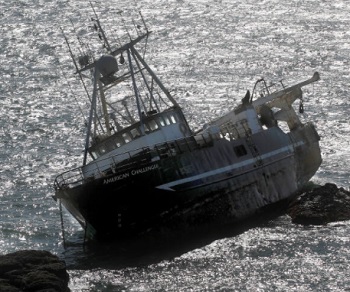
Wreckage Removal on Hold! F/V American Challenger stuck on Marin coast until salvage funds identified
State and federal officials are wrapping up their emergency response to a wrecked fishing vessel on the northern Marin coast,,, Tom Cullen, administrator for the state Office of Spill Prevention and Response, was outwardly frustrated by the long-running discussions about the problem and, in particular, by the American Challenger — an uninsured boat from out of state on its way to be scuttled being towed by a tugboat that also was uninsured.,, Both the tugboat and the 1975 American Challenger are owned by Ship International Inc., whose principal, Felix Vera, are not able to fund the salvage. video, >click to read< 10:04
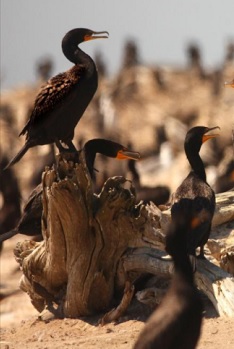
Saving salmon is a ruse for breaching our dams
In the early 1990s, our small group were researching environmental claims that the lower Snake River dams were devastating salmon runs. At that time, we learned about East Sand Island, a man-made island in the estuary of the Columbia River. This island was formed from dredging deposits in 1983. And by 1984 Caspian terns, cormorants and gulls, which had colonized the island, were feasting on salmon smolts. We thought: “Wow, this is an easy fix. Tear out a man-made island and save millions of endangered fish.” The environmentalists beat us to the punch. They filed in federal court to protect the island and the birds under the Migratory Bird Treaty Act of 1918. Now we have the largest nesting colony of these non-endangered birds in the world on a man-made island. >click to read< 08:38

Declining salmon runs to restrict 2021 commercial season
During a press briefing on Friday morning, John McManus President of the Golden State Salmon Association said the added restrictions will deal a blow to commercial fishermen. “You may wonder why we’re in this predicament this year, there are some near term and some longer-term reasons why but at the end of the day, we’re seeing a decline in our salmon runs here in the state of California,”,,, Joe Conte said his biggest concern is losing more of his fleet. “I saw a lot of guys just kind of hang it up during crab season, a lot of guys saying they were gonna see how salmon turned out before they made some life decisions,” >click to read< 09:55
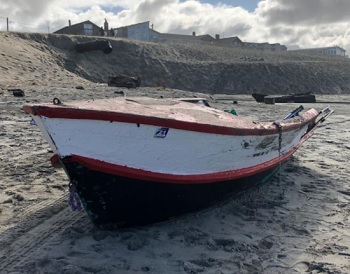
Boat capsizes near Cape Kiwanda due to rough conditions
Despite being cautioned by fellow dory fishermen due to adverse conditions, a commercial fisherman launched his 21-foot wooden dory boat into the surf to retrieve his crab gear. According to Marine Deputy Dennis Greiner’s investigation and interview with the captain, the captain and one observer occupied the boat. The two men were making their third attempt to get through the surf when they took water over the bow. The captain then decided it was too rough and turned around to head back to the beach. >photos, click to read< 09:03
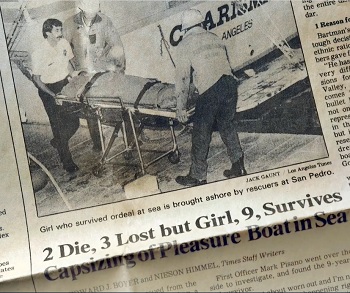
I’m Desireé – Woman Reunites With Her Rescuers 35 Years After They Saved Her Life
In 1986, Desireé Rodriguez and her family went on a day trip on their family boat. What started as a carefree day trip soon turned into tragedy. At the time, Rodriguez, who was 9-years-old, had fallen asleep next to her little sister at a table on the boat’s lower deck. She was awakened by her father’s orders to get out of the ship because it was sinking. “One by one, her family members just let go of life. All hope seemed lost, but then a group of fishermen spotted her. Paul Strasser and Mark Pisano are two long-time fishermen based out of San Pedro. Great story, with an emotional video. >click to read< 07:33

From Oregon to Massachusetts, fishermen’s wives associations are the backbones of their communities
In spring 2020, the fishing community of Newport, Oregon, shuttered along with the rest of the country. A coronavirus outbreak at a local Pacific Seafood processing plant left fishermen sitting on docks with no buyers for their Dungeness crabs, while restaurants closed and families found themselves housebound. That’s when Taunette Dixon and her organization, the Newport Fishermen’s Wives, stepped in.,,, In Massachusetts, the Gloucester Fishermen’s Wives Association was founded in 1969. “We were shore captains,” said Angela Sanfilippo. “We would make sure when the boats came in, they’d get everything they needed so they could go back out the next morning at 2.30. The wife would be responsible to make sure these things happened. As their wives, we knew more than them.” >click to read< 11:32

Deadliest Catch season 17 – What a Time to be Alive!
In season 17, Discovery says that “half the crab boats of the Bering Sea fleet are tied up in Seattle” while “an existential threat faces the fishermen who make the long-haul trip to Dutch Harbor, Alaska,” because they face “a potential closure of the entire fishery” for the 2021 season. The crab survey conducted during the summer by the Alaska Department of Fish and Game didn’t happen because of C0VID-19, and that means “the captains will be fishing blind with no charts or guidance on where to find crab on the grounds, making an already challenging season even more difficult,” short trailer, >click to read< 10:03
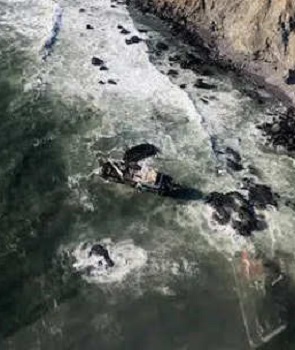
State and local agencies continue work to address grounded vessel at Dillon Beach
Officials said the Coast Guard Sector San Francisco watchstanders received initial reports at 8:45 a.m. Friday, March 5, that the American Challenger was being towed southward by the Tug Hunter from Puget Sound, Washington, when the Tug Hunter lost propulsion due to a rope entangling the propeller. On Tuesday, the California Department of Fish and Wildlife said marine surveyors boarded the American Challenger to continue their inspection of the vessel’s fuel tanks by using sound tapes and paste to get an accurate reading of the amount of fuel aboard. >click to read< 07:45
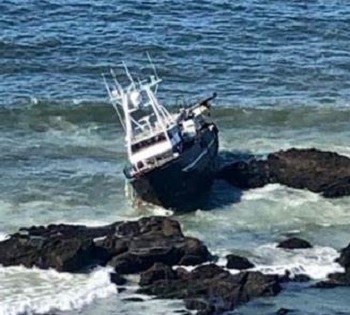
Oil contamination found at Marin beach when vessel grounds following towing incident
The incident happened Friday morning while the 90-foot fishing boat was being towed south from the Seattle area, according to the California Department of Fish and Wildlife. The tugboat Hunter became disabled when a rope got tangled in its propeller. Rough sea and poor visibility forced the tug crew to discontinue the job, the department said. The tugboat was towed to Sausalito, and the fishing boat drifted into the rocks south of Estero de San Antonio. The boat, named American Challenger, is being watched by officials,,, On Monday, the Coast Guard did not have an estimated time in which the fishing boat could be removed. >click to read< 12:10
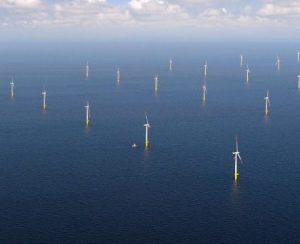
Momentum building for California offshore wind farms
Last month, Assemblyman David Chiu, D-San Francisco, introduced a bill that sets a target of generating 3,000 megawatts of offshore wind by 2030, which could power hundreds of thousands of homes, and 10,000 megawatts by 2040. “Put in perspective, the larger target is nearly equal to the electrical generating capacity of all the large solar farms in California today and nearly double all the wind farms now operating on land in California,”. Chiu said his Assembly Bill 525 would create 14,000 jobs. (sure!) Commercial fishing organizations also have expressed concerns about whether the wind farms would put fishing areas off limits. >click to read< 13:02
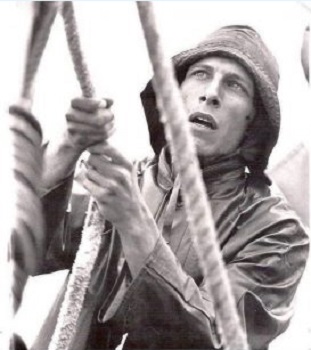
Remembering John Picinich, 1949-2021
John Picinich, 71, a longtime resident of West Seattle who retired to Las Vegas, passed away on February 23, 2021. He was born December 19, 1949 in Tacoma to John and Johanna Picinich. He found the love of his life at the age of 20 in West Seattle, when he married Carol Ewing. John attended West Seattle High School. He went on to become a marine pipefitter and commercial fisherman. John was a member of Local 32 Plumbers & Pipefitters Union and worked at various shipyards in Seattle for many years. He fished for salmon in Alaska and the San Juans. and was the co-owner of the F/V Joanna. >click to read< 14:50
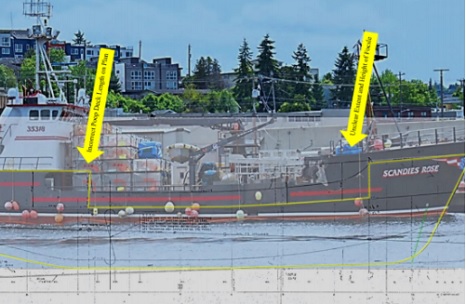
F/V Scandies Rose: Inaccurate Design Calculations May Have Put Scandies Rose in Harm’s Way
According to the Marine Safety Center, the hydrostatics model that the naval architect provided for the vessel “did not accurately represent the F/V Scandies Rose,” for multiple reasons. MSC alleged that it did not accurately model poop deck or forecastle enclosed volume, did not model the bulwarks, had significantly less superstructure windage than the actual vessel, appeared to have much different tank capacities than the vessel capacity plan, and neglected downflooding in calculations. >click to read< 07:50
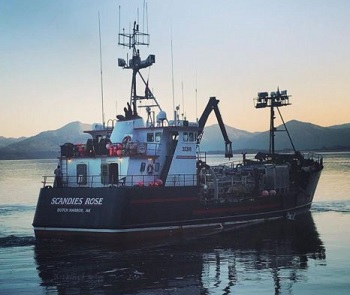
F/V Scandies Rose: U.S. Coast Guard and NTSB conclude formal public hearing proceedings of the tragedy
The joint investigation board reviewed and considered evidence related to the loss of the fishing vessel, which occurred on Dec. 31, 2019. The board heard from 43 witnesses, who provided testimony into the conditions influencing the vessel prior to and at the time of the casualty. Testimony also focused on weather, icing, training fisheries, the Scandies Rose’s material condition, owner and operator organizational structures and culture, the regulatory compliance record of the vessel, Coast Guard policy, and practices related to vessel design, engineering and inspections.,,, Recordings of the proceedings are available,,, Documents, exhibits, helpful videos, Board biographies, and other hearing information is available >click to read< 15:43

Obituary: Todd Arlen Chase
Todd Chase, 51, passed away Feb. 20, 2021, in a tragic commercial boating accident, aboard the F/V Coastal Reign, on the bar of Tillamook Bay and Garibaldi. Todd was born in Portland on Jan. 9, 1970. He spent his teenage years in Tillamook County. His surviving parents are Frank and Charlotte Chase, of Warrenton. Todd was always known for his strong work ethic and a love and appreciation of the water. From the age of 14, Todd was working on commercial fishing boats, in canneries and in construction. At the age of 21, he met Angeline Steinman at a Christian event. From that moment the chase was on. In August 1991, they married. There will be a funeral service to honor his life and what it stood for. >click to read< 22:43
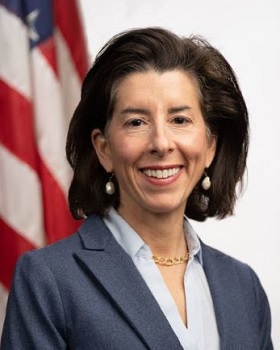
Gina M. Raimondo Sworn in as 40th U.S. Secretary of Commerce
Gina M. Raimondo was sworn in as the 40th U.S. Secretary of Commerce. Secretary Raimondo was sworn in by Vice President Kamala Harris after a bipartisan vote of 84-15 in the United States Senate. In her role as Secretary of Commerce, Raimondo will lead a key agency focused on promoting economic growth, >click to read<11:20

Obituary: Commercial Fisherman Edwin Lee Owings, 1958-2021
Eddie passed away peacefully on February 23, 2021, at 62 years old, in Crescent City. He was born in Fort Bragg to Thelma and Joel Owings. He made many lifelong friends through his fishing adventures. Being a commercial fisherman and eventually Captain of the F/V Carmelia Maria was his livelihood for many years. He leaves behind his two children Cara Owings and Emily Reed (Thomas). He also leaves behind his fiancee Angelina of 15 years. He will be deeply missed by all those that knew him. >click to read< 18:53
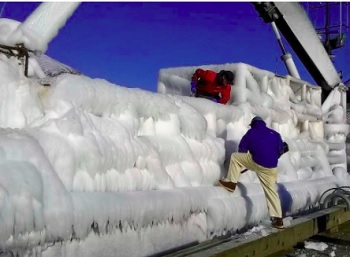
F/V Scandies Rose: Investigation Takes a New Look at Crab Boat Stability
Last week’s hearings on the tragic sinking of the ill-fated fishing vessel Scandies Rose have raised questions about the stability booklet requirements for crab boats, which are routinely exposed to severe freezing spray in Alaskan waters. Many crab boat sinkings have been blamed on ice buildup and loss of stability over the decades, but the U.S. Coast Guard design standard for ice accumulation relies on an IMO rule that was not formulated with crab vessels in mind, leading several naval architects who testified last week to question whether it is time for a revision. >click to read< 09:19

Coast Guard medevacs woman from fishing vessel near Cold Bay, Alaska
The Coast Guard medevaced a woman from a fishing vessel approximately 101 miles northwest of Cold Bay, Alaska, Sunday. An Air Station Kodiak MH-60 Jayhawk helicopter crew hoisted the woman at 10 p.m. and safely transported her to a LifeMed flight team in Cold Bay for further transport to Anchorage. Watchstanders at the 17th District command center in Juneau received a medevac request,,, >click to read< 16:53
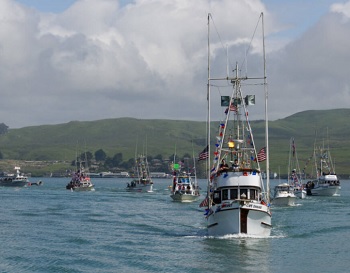
Festival that supports the Bodega Bay fishing fleet missing community
Since 1973 the Bodega Bay community has hosted an annual Fisherman’s Festival,, The blessing of the Fishing Fleet is the highlight of the Bodega Bay Fisherman’s Festival. These solemn annual blessings had their start more than 50 years ago when the event was part of the “Discovery Days Celebration”,,, It is with much regret that we cancel the 2021 edition of the Bodega Bay Fisherman’s Festival (as well as our 2020 festival). While we remain hopeful that Sonoma County continues to gain ground against the coronavirus threat, at this moment hosting the festival on its traditional Spring date creates too great of a risk for our volunteers, vendors, and guests. >click to read< 15:32

F/V Scandies Rose: Expert witnesses point to flawed stability calculations
When the Scandies Rose sank on New Year’s Eve of 2019, fishermen from all over Alaska were shocked. Five of the crew perished when the ship rolled onto its side, along with the ship’s captain Gary Cobban. Two crewmembers were rescued from a life raft by a Coast Guard helicopter crew.,, This week, the Coast Guard convened a Marine Board investigation into the cause of the sinking. So far, expert witnesses have described serious problems with the boat’s stability report, which is a rating of how stable the vessel is and how much equipment it can bear. And those issues might extend to many other fishing boats around Alaska. >Audio, click to read/listen< 09:54
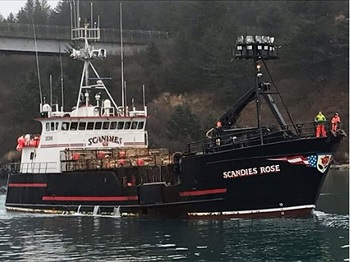
F/V Scandies Rose: Tragedy survivor details harrowing experience during sinking
Jon Lawler, who was on the F/V Scandies Rose on Dec. 31, 2019, when the boat began rapidly sinking into the sea,,, As soon as things began going wrong around 10 p.m. that New Year’s Eve, Lawler knew something was severely amiss, he said, and immediately ran upstairs, encountering Capt. Gary Cobban in the process. “And I look at Gary,” he said. “And I said, ‘What the f— is going on? What’s going on?’ And he said, ‘I don’t know what’s going on. I think we’re f—— sinking.’ ‘No f—— s— we’re sinking.’ Fast forward, and Lawler would miraculously make it outside the boat alive, donning a rescue suit. That, though, was hardly the end of the distress. Video, >click to read< 13:35
Cobban in the process. “And I look at Gary,” he said. “And I said, ‘What the f— is going on? What’s going on?’ And he said, ‘I don’t know what’s going on. I think we’re f—— sinking.’ ‘No f—— s— we’re sinking.’ Fast forward, and Lawler would miraculously make it outside the boat alive, donning a rescue suit. That, though, was hardly the end of the distress. Video, >click to read< 13:35
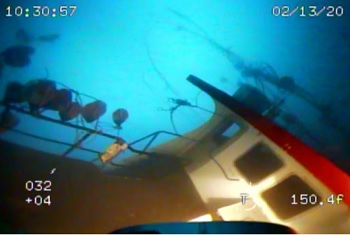
F/V Scandies Rose: Survivor Jon Lawler’s Wrenching Testimony, Experts note serious flaws in a USCG regulation
The architects who testified were not involved with the development of the stability booklet for the Scandies Rose, a Washington managed boat which went down around 10 p.m. in the Gulf of Alaska during a storm that generated National Weather Service warnings of heavy freezing spray. Also Wednesday, Jon Lawler, one of the two survivors of the seven-person crew, offered wrenching testimony of the final minutes before the boat went under. After donning a survival suit, he exited the wheelhouse amid what he described as sheer panic as the boat tilted crazily and tossed people about. >click to read< 17:38






